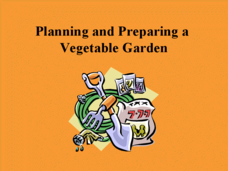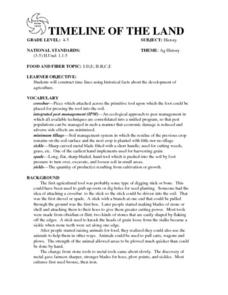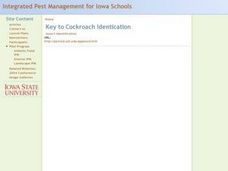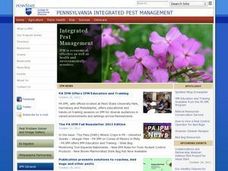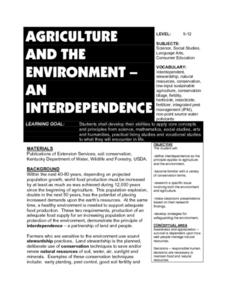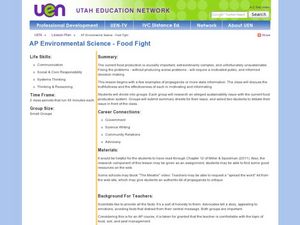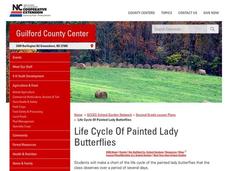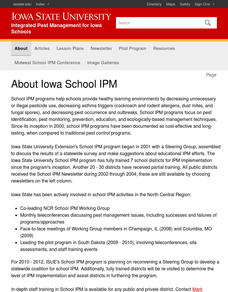Curated OER
Insect Biology and Ecology: A Primer
Students explore insects and closely related organisms. They examine the growth and development of a lady beetle. Students classify insects and organize them. They investigate pest management.
Curated OER
Bug Time
Pupils identify basic pest they find in the school yard. They discover and examine pest control. They also explain the benefits and risks of pests. High school students present a short lesson to third graders.
Curated OER
Planning and Preparing a Vegetable Garden
An anticipatory slide suggests personal benefits from gardening. Then the presentation goes into choosing a location, considering soil type, the use of fertilizers, and the variety of crops available to choose from. If you are teaching...
Curated OER
TIMELINE OF THE LAND
Learners construct time lines using historical facts about the development of agriculture. Students research specific dates and events and report their findings to the class. Learners tape or glue the sections together sequentially in a...
Curated OER
Pesticides in Schools
Students investigate the practices their school uses for pest control. Depending on their findings, students may suggest alternative, non-chemical methods. They present a pest control plan to school officials. Great, real life...
Curated OER
Totally Termites
Students explore the world of termites, their adaptations, and anatomy. They examine the property risks of termites and how pest control professionals manage termite problems.
Curated OER
Horticulture Crops in the agro-ecosystem
Ninth graders apply ecological analysis to fruit and vegetable production systems. In this horticulture lesson students learn about different management practices.
Curated OER
Mapping Animal Behavior
Young scholars discuss the value of sampling in science. They, in groups, map cricket movement in response to various stimuli and graph their results.
Curated OER
The Invasion of the Medfly
Students examine the invasion of the fruit fly in California. In groups, they observe and record the fruit fly's lifecycle and how they affect humans in society. They also discuss the history and geography of the fly and the different...
Cornell University
Insect Anatomy
Young entomologists discover insect anatomy in a very detailed unit plan. Offering background information for teachers about various insects, class members explore the differences between bugs and insects—and yes, there are many...
Curated OER
Environment: Insects and Pesticides
Students classify bugs as pest or non-pests and identify ways to control them. They also examine the three levels of pesticides by reading the labels. Students complete charts of signal words on pesticide labels.
Curated OER
LD50 of NaCl to Gammarus spp.
High schoolers learn the meaning of LD50 through lecture and discussion. Through experiment, students graph and calculate the LD50 of salt on fresh water amphipods. High schoolers compare results of the experiment with pesticides and...
Curated OER
Sustainable Agriculture: Soils And Food Production
Ninth graders recognize differences in soil quality from one area to another. They describe the importance of organic matter in soil health and suggest ideas that help provide adequate food supplies for the world. The interview a person...
Curated OER
What's Hiding in Your Home Cabinets?
Pupils analyze a variety of products found in their own homes to determine their toxic content. They identify words such as caution, warning or danger and relate them to their relative toxicity levels.
Curated OER
Create a Soil Aggregate
Students simulate the conditions which occur in a soil aggregate. They explain how IPM affects the environment. They identify the cast of characteristics to develop their aggregate.
Curated OER
Weeds-Wild and Wonderful
Students compare and contrast weeds and desirable plants. They explore the ways which their ancestors used weeds and depended on them for food and other household necessities.
Curated OER
Spiders are Special
First graders recognize that spiders are important natural predators. They work in small groups with simple field guides to identify as many of their spiders as they can.
Curated OER
Agriculture and the Environment
Young scholars investigate the interdependence of agriculture and the environment. They research areas of interdependence and provide examples of situations where farmers are practicing conservation in the local area. Their findings are...
Curated OER
AP Environmental Science-Food Fight
The content in this lesson is of a controversial nature. Please review to make sure it is suitable for your class. A video, The Meatrix is shown to the class, and then they discuss the emotionally-charged language that it uses. They are...
NC Cooperative Extension, Guilford County Center
Life Cycle Of Painted Lady Butterflies
The Very Hungry Caterpillar is the inspiration for this project-based learning activity. Kindergartners create a lifecycle chart for a butterfly with four sections: egg, caterpillar, pupa, and butterfly. It is a three-dimensional...
Curated OER
A Yen for Maximum Residue Limits in Food
Future public health officials or agriculturists read an article and answer questions concerning the Japanese regulations for pesticide exposure. They compare the maximum residue limit for two, 4-D of Japan with other countries. This is...
Curated OER
Ipm Pesticides And Regulations
Twelfth graders explore the process by which environmental laws and regulations are developed, passed, and enforced. They identify the major agency and office responsible for enforcing pesticide legislation and research the laws that...
Curated OER
And Just How DO You Kill A Weed?
Students explain chemical, cultural and biological weed control methods. They design and conduct an experiment to simulate a weed control method and explore various ways to prevent weed dispersal.
Curated OER
PESTICIDES AS CHEMICAL TOOLS IN IPM
Tenth graders explore the importance of pesticides as chemical tools. The chemistry of a pesticide is important for understanding the composition of the product, the classification of pesticides according to their use and the...
Other popular searches
- Integrated Pest Management
- Pest Management Products
- Pest Management Information
- Intergrated Pest Management
- Inter Grated Pest Management




